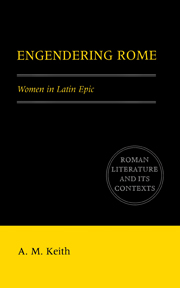5 - Over her dead body
Published online by Cambridge University Press: 02 December 2009
Summary
The death of a beautiful woman is, unquestionably, the most poetical topic in the world.
(Edgar Allan Poe, ‘The Philosophy of Composition’)In Greco-Roman mythology and legend, the death of a beautiful woman often serves as the prelude or postlude to war. Thus the Greek expedition to Troy departs from Aulis only after the sacrifice of Iphigenia, the daughter of the commander-in-chief. When the Greek army is similarly becalmed in Thrace after the Trojan war, the sacrifice of Polyxena appeases the wrath of Achilles' ghost and secures the Greek ships favourable winds for the homeward journey. Although Homeric epic takes as its primary subject the Trojan war and its aftermath, the poems ignore the deaths of these maidens in their focus on male death and heroism. This omission is striking since we know that two of the Cyclic epics included the deaths of Iphigenia (Cypria) and Polyxena (Iliupersis; cf. Cypria fr. 27). Although the motif gained prominence in fifth-century Athenian drama, it never seems to have achieved canonical status in Greek epic. In the Hellenistic period Callimachus set a woman's unheroic death at the centre of his Hecale but his innovation does not seem to have inspired imitation, if Apollonius' contemporary composition of an Argonautica (despite the prominence of Medea in books 3 and 4) and a host of titles of works now vanished offer a reliable index of the state of Hellenistic Greek epic.
In Roman epic, by contrast, dead and dying women assume a new thematic and aesthetic prominence, for the beautiful female corpse possesses an intrinsic importance in Roman political myths of war and city foundation, the pre-eminent subjects of epic at Rome.
- Type
- Chapter
- Information
- Engendering RomeWomen in Latin Epic, pp. 101 - 131Publisher: Cambridge University PressPrint publication year: 2000

